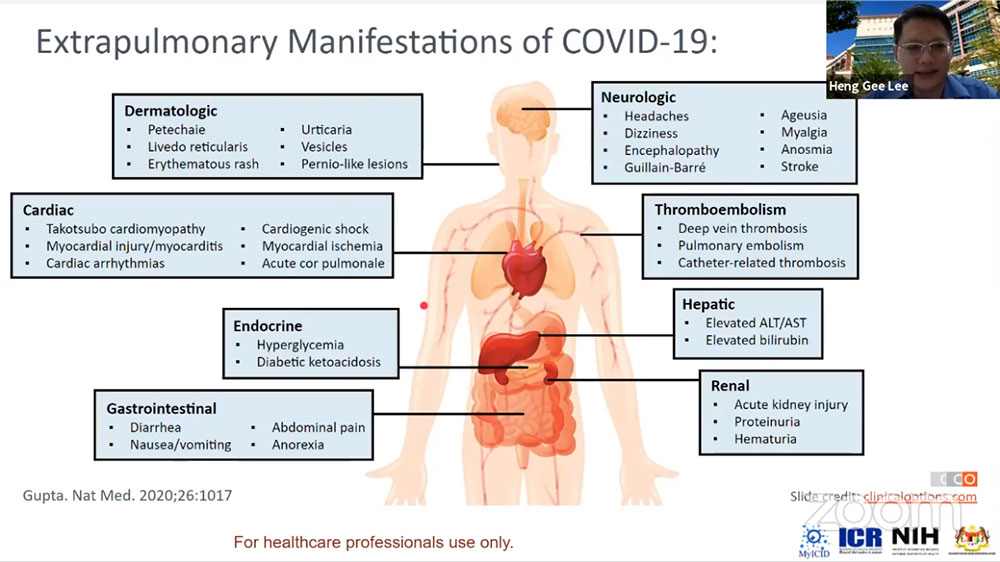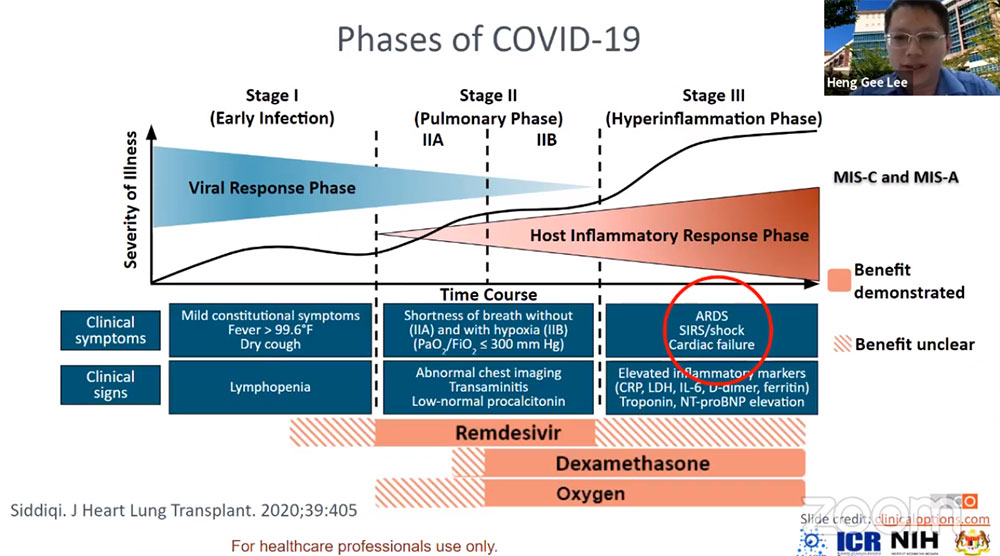COVID-19 | A programme for post-Covid-19 patients should be set up in the country, as even those who were asymptomatic or had mild symptoms later developed complications, a specialist treating Covid-19 patients said.
Dr Lee Heng Gee, who heads the infectious diseases unit at Queen Elizabeth Hospital, said multiple patients have been discharged after experiencing mild symptoms or were asymptomatic, only to end up back in the hospital with acute complications.
Queen Elizabeth Hospital is the largest Covid-19 hospital in Sabah.
"We need to look out for post-Covid-19 syndromes and we need a programme for these patients which should involve rehabilitation and psychiatry.
"From our perspective, we need to involve family medicine physicians as well in the development of these post-Covid-19 treatment programmes," he said.
Sharing case studies of patients at the hospital, he said, one 36-year-old man was discharged well after spending 10 days in a low risk and quarantine centre, only to experience sudden chest pains while driving two weeks later.
Tests conducted found he had scarring in his lungs and acute myocarditis (inflammation of the heart). He was treated with dexamethasone, and is now doing well, Lee said.
The specialist was speaking as part of a webinar series on Covid-19 by the Malaysian Society of Infection Control and Infectious Diseases and the Institute of Clinical Research of the National Health Institute.
Children and young people affected too
Lee said what happened to the patient was not unheard of, with various studies around the world reporting such conditions among former Covid-19 patients.
A German study of 100 patients who recovered from Covid-19 found that 78 percent of them had cardiac involvement while 60 percent had ongoing myocardial inflammation.
Another study involving young athletes infected with Covid-19, but had mild or no symptoms, also found five out of 26 of them developed myocarditis, he said.
"The take-home message from this is, even though a patient has mild symptoms or is asymptomatic, they can still have myocarditis or ground glass opacity in the lungs," he added.
Ground glass opacity refers to a pattern which emerges in the lungs during a scan, this could indicate various complications including infection, excess fluid or bleeding in the lungs.
Besides myocarditis and lung problems, syndrome physicians worldwide are looking out for Multiple Inflammatory Syndrome in children or adults (Mis-C or Mis-A) among former Covid-19 patients, he said.
Mis-C was discovered during the outbreak in New York City, when physicians noticed a surge of patients under the age of 21 reporting severe complications two weeks or more after contracting the virus. In June last year, similar conditions were reported among adults (Mis-A).
In many cases, Lee said, the children were asymptomatic prior to that and were only found to be Covid-19 positive retrospectively through antibody testing.
The US Centre for Disease Control and Prevention (CDC) defined Mis-C as a condition where different parts of the body are inflamed, including the heart, lungs, kidney, brain, skin, eyes and gastrointestinal organs, when the child has had the virus or was a close contact of someone infected, and any other diagnosis has been ruled out.
"It's very important for us (in Malaysian healthcare) because adult medicine (departments) takes care of patients from aged 12 onwards. We might see some patients coming in with Mis-C," he said.
Half reported worsening quality of life
The doctor added that studies internationally found most patients reported fatigue, cough, loss of taste, loss of smell, congestion, dyspnea, chest pain, abdominal pain and confusion, or "brain fog", a few weeks after recovery.
Many still experience fatigue or breathlessness up to two months after, while some who were treated in the intensive care unit experienced post-traumatic stress disorder, anxiety, depression and concentration problems, he said.
"Only 12.6 percent of patients were completely free of symptoms while half reported worsening quality of life compared to before the infection," he said, citing a study on patients in the US last year.
He added that this is consistent with findings in studies looking at long-term impact of the Sars infection, which found patients experiencing fatigue, muscle pain and depression up to 36 months after recovery.
Learning from this, he said, multidisciplinary teams of respiratory physicians, psychologists and cardiologists as well as family medicine physicians should be roped in to provide post-Covid-19 care.
"Overseas, they have post-Covid-19 clinics, which is good. They have programmes and guidelines.
"But looking at the local situation... most of our manpower is exhausted in the hospitals, so we rely a lot on our family medicine specialists to coordinate the post-Covid-19 care.
"I hope the level of cases will come down and I can run my post-Covid-19 clinic," Lee said. - Mkini






No comments:
Post a Comment
Note: Only a member of this blog may post a comment.